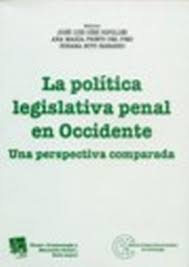Lessons of Spanish substantive criminal law
General part I. Legal theory of crime I. Tipicity
- ISBN: 9788413087900
- Editorial: Editorial Aranzadi
- Fecha de la edición: 2021
- Lugar de la edición: Pamplona. España
- Colección: Estudios
- Encuadernación: Rústica
- Medidas: 24 cm
- Nº Pág.: 156
- Idiomas: Español

This book is a follow up to Lessons of Spanish Substantive Criminal Law. General Part I. Scope of Application of the Spanish Substantive Criminal Law (2017). Its main purpose is to fill an existing gap by providing Spanish students with an updated comprehensive overview of typicity as a category of the legal theory of crime. Therefore, a number of key issues are addressed in considerable depth, such as the criminal behaviour as action or omission, action/omission as a typical behaviour and the agents thereof , the kinds of typical structures, the objective type of result crimes (factual causation, legal causation…), the subjective type of intentional crimes, negligent offences, omission offences, the stages of fulfilment of the crime, and principals and accessories to the crime. Notwithstanding this, given that it has been conceived as a course-book, footnotes have not been used in order to render the text easier to read. Every lesson is closed by a self-assessment multiple choice quiz section and an appendix containing the right answers has been included, so that students themselves can test the level of knowledge acquisition they have reached. Moreover, this book aims to be a useful tool for Spanish scholars and legal practitioners in order to improve their ability to use English in both academic and professional contexts and to increase their knowledge of this language in the field of criminal law. Another purpose of this work is to provide foreign scholars and law professionals with a starting point for researching Spanish substantive criminal law.
LESSON 1 THE CRIMINAL BEHAVIOUR AS AN ACTION OR OMISSION
1. Human behaviour as a starting point for an offence
2. Notion of an «act(ion)»
3. Exclusion from action/omission
4. The actio libera in causa
5. Self-assessment multiple choice quiz
LESSON 2 THE ACTION/OMISSION AS A TYPICAL BEHAVIOUR. THE AGENTS
1. The typical action/omission
2. The agents of the action/omission
3. Self assessment multiple-choice quiz
LESSON 3 THE OBJECTIVE TYPE OR ACTUS REUS. TYPICAL STRUCTURES
1. General overview. The notion of a type of the illicitness
2. The objective type (actus reus). General remarks
3. Kinds of typical structures regarding the actus reus
4. Self-assessment multiple choice quiz
LESSON 4 THE OBJECTIVE TYPE OR ACTUS REUS OF RESULT CRIMES
1. General remarks. Typical elements
2. Factual causation
3. Legal causation (=objective imputation criteria)
4. Self-assessment multiple choice quiz
LESSON 5 THE SUBJECTIVE TYPE OR MENS REA (I). INTENTIONAL CRIMES
1. General remarks
2. The original subjective elements
3. Dolus/intent as an element of the subjective type
4. The constituting elements of dolus/intent
5. Intentional types of illicitness which require an additional subjective element
6. Disvalue of action and disvalue of result in intentional commission crimes
7. Self-assessment multiple choice quiz
LESSON 6 SUBJECTIVE TYPE (II). NEGLIGENT CRIMES
1. The principle of exceptional punishment of negligent criminal offences
2. Terminological issues
3. Basic remarks on negligence
4. Objective due care
5. Kinds of negligence
6. Factual causation and objective imputation in negligent crimes
7. Subjective type
8. Disvalue of action and disvalue of result
9. Self assessment multiple choice quiz
LESSON 7 TYPICITY IN OMISSION CRIMES
1. Preliminary considerations
2. Classification of crimes of omission: crimes of mere omission (or proper crimes of omission) and crimes of commission by omission (improper crimes of omission). The intermediate category: proper crimes of omission with a guarantor position
3. Crimes of mere omission (or proper crimes of omission): objective type or actus reus
4. Crimes of commission by omission (improper crimes of omission): objective type or actus reus
5. Subjective type or mental element (mens rea) of the omission crimes
6. Self-assessment multiple choice quiz
LESSON 8 STAGES OF FULFILLMENT OF THE CRIME
1. Iter criminis
2. First stage of the perpetration of a crime. Internal acts
3. Second stage of the perpetration of a crime. External acts
4. Third stage of the perpetration of a crime. The consummation of the crime
5. Self-assesment multiple choice quiz
LESSON 9 PRINCIPALS AND ACCESSORIES
1. Preliminary considerations
2. Principals
3. Accessories
4. Acting in the place of another
5. Self-assessment multiple choice quiz








